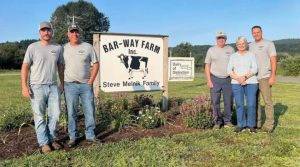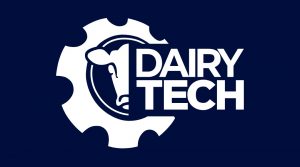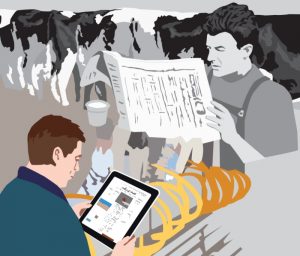
Yet Steve’s start in dairy differs from many. In 1986, he quit his job at Cold Spring Granite Company, purchased a small herd of cows and rented a barn on the very same farm he milks on today.
Fast-forward and today, Steve and his wife, Cheryl, milk 60 cows with one robotic milker and farm 200 acres on their dairy, Schlangen Dairy Farm in Albany, Minn.

“With the crop rotation and the manure we get on, we generally have more than enough feed for raising our replacement heifers and feeding our cows,” he says.
The Schlangens are one of the four recipients of the U.S. Dairy Sustainability Award. Cheryl says that they are proud that a small farm is represented on a national scale.
“Almost everything we do can be replicated by others,” Steve adds.
The couple has employed more than 30 conservation practices over time, including cover cropping, establishing buffer strips, variable rate fertilization, LED lighting in the barn, variable rate vacuum pump, as well as a manure stacking slab and an injecting manure system.
“If you can farm for good yields while making the land better year in and year out, it’s a win-win,” Steve says.
SUSTAINABLE IMPACT
Steve says that grid sampling has had the most impact on their nutrient management plan.
“The grid sampling costs more money upfront, but then you know exactly what you need and where you need it,” he says. “Then you can apply what you need accordingly.”
The Schlangens found out after implementing grid sampling that before, they were applying fertilizer where it didn’t need to be.
“To me, it was a huge change because we generally would fertilize the whole field the same,” he says.
Once using grid sampling, Steve was surprised by how big the variation was for nutrient needs within a single field.

EVALUATE ROI
Steve says that what makes the industry great is sharing ideas that might work for other farmers. This led to his involvement with the Headwaters Agriculture Sustainability Partnership (HASP) which finds solutions that benefit the environment, farming economy and vitality of rural communities.
Evaluating the return on investment firsthand, the Schlangens involvement gauges their ROI on investments in various sustainable farming practices that improve soil health, store carbon in the soils and reduce nutrient runoff.
“We’re one of the few industries that can be a part of a solution for the environment, and we should embrace that,” Steve says.

Steve adds that winning this award shows farmers that sustainability efforts don’t have to be complex to make a difference.
“There are a lot of options out there and trying different things can increase the bottom line, as well appeal to consumers,” he says. “At the end of the day, they like to know farmers care about their animals and the environment and they’re producing nutritious dairy products in a sustainable matter.”
























